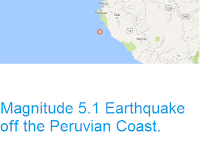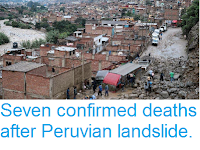Mount Sabancaya in southern Peru underwent a series of large eruptions on Monday 26 December 2016, starting at about 8.20 am local time, with the largest eruption producing an ash column that rose 2.5 km above the summit of the volacano. Sabancaya is a 5967 m stratovolcano (cone shaped volcano) located on a
saddle between the older, and larger Hualca Hualca and Ampato, neither
of which has been active in historic times. The three volcanoes are
located in the Andes of southern Peru. Eruptions were first recorded on
Sabacnya by Europeans in 1595, and the volcano is likely to have been
intermittently active prior to this. The volcano erupted a number of
times in the eighteenth century, then remained quiet until 1986, since
when it has undergone six bouts of explosive eruption.
Eruption on Mount Sabancaya. AOL.
The volcanoes of the Peruvian Andes, and of South America in general,
are fueled by the subduction of the Nazca Plate beneath the South
American Plate. The Nazca Plate underlies a large chunk of the eastern
Pacific Ocean, and is being subducted along Peru-Chile Trench to the
west of South America. As it sinks into the Earth, the Nazca Plate
passes under South America, where it is heated by friction with the
overlying South American Plate and by the heat of the planet's interior.
This causes the Nazca Plate to partially melt, and some of this melted
material then rises through the South American Plate as magma, fueling
the volcanoes of the Andes. The motion of one plate beneath another is
not a smooth process, and the Nazca and South American Plates frequently
stick together, then break apart as the pressure builds up, triggering
frequent Earthquakes along the western coast of South America, and
sometimes further inland.
The subduction of the Nazca Plate beneath the South American Plate, and how it causes Earthquakes and volcanoes. Pacific Earthquake Engineering Research Center.
See also...
Follow Sciency Thoughts on Facebook.








